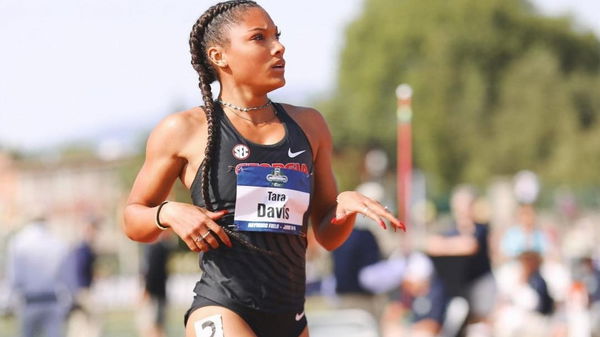

Tara Davis-Woodhall emphasized the importance of speaking up when fairness was questioned amid controversy over the Paris Olympics qualification process. Earlier this year, World Athletics announced a $50,000 reward for track and field stars who medaled at the Games. While praised, this gesture raised questions about why financial support hadn’t been provided earlier. Athletes questioned why backing wasn’t offered to cover expenses like training, travel, and other necessities before the Olympics.
Davis-Woodhall, the 2023 World Athletics silver medalist, has spoken out about these issues, emphasizing the need for a fair and transparent selection process.“Every athlete deserves an equal chance to compete,” she stressed, bringing attention to the collective call for accountability and fairness. Tara criticizes the current sponsored system for its limitations in supporting athletes’ financial needs.
ADVERTISEMENT
Article continues below this ad
Tara Davis-Woodhall bashes the existing sponsored system
In a recent tweet, track and field star Tara Davis-Woodhall, who won the 2024 World Athletics Indoor Championships took a stand against athletes flying economy to attend the Paris Games. The long jumper captioned it, “As helll!!!!!! I feel the entire Olympic team should be getting first class… like yall are THE Olympic sponsor.” This came in reply to Harrison Williams’ original tweet where he tagged and requested Delta Airlines for some good seats on their flight to Paris saying, “Can we please get 3 business class tickets to Europe for the games? We’re all 6’5 and need those spacious lay-flat seats so we’re ready to compete.”
As helll!!!!!! I feel the entire olympic team should be getting first class… like yall are THE Olympic sponsor https://t.co/aMB6iOoeeO
— tara davis woodhall (@tar___ruh) June 26, 2024
He qualified for the decathlon event in third place, with a score of 8,384 points. Joining him are Heath Baldwin, who came first with a score of 8,625, and Zach Ziemek in second place with 8,516 points. Before the last itself, Forbes had released an article detailing how much it costs athletes to become Olympians. Apparently, it can cost anywhere between $15,000 to $35,000 on average per year to train. Additionally, this is not compensated since athletes don’t get regular wages and put off those careers till their retirement in their 20s or 30s. Even the cash prize for winning different leagues and competitions does not prove to be enough.
ADVERTISEMENT
Article continues below this ad
Not only this, the broadcast networks’ natural favoritism cuts short most athletes’ screen time and exposure. Tara Davis-Woodhall recently criticized NBC’s coverage of the track and field trials. She shared a fan’s post questioning NBC’s focus on track events over field events like the triple jump, writing, “showwww the field events?” Davis-Woodhall tagged USATF, Peacock, and Tracktown, adding, “I WANT TO SEE TRIPLE JUMP!” She also suggested, “Split the screen to show field and track”. NBC’s preference for highlighting athletes like Ryan Crouser during his shot put event illustrates the disparity in coverage. This limited exposure affects how athletes gain recognition and opportunities for sponsorships.
Many athletes suffering from the monetary plight
Marathoner Ashley Uhl-Leavitt recently spoke about having to work side jobs as a personal trainer and bartender to support herself despite making the Olympic team. This is because sponsorships are not distributed evenly throughout the system and Uhl-Leavitt barely earns anything from her athletics career. Decathlete Jeremy Taiwo, who finished with a silver after Ashton Eaton had to rely on crowdfunding, which he said was “literally the only thing that helped me train throughout the entire year.”
ADVERTISEMENT
Article continues below this ad
At one point, even Gabby Douglas’ mother had to file for bankruptcy due to the high costs of Douglas’ training. The financial situation for top-ranked American athletes is dire, with some receiving only $17,000 per year. Boxer Jennifer Lozano had to turn to GoFundMe, a crowdfunding platform, to raise money for her coach and family to attend the Olympics, as the stipend from USA Boxing covered only her day-to-day expenses. This financial strain stands in stark contrast to the revenues earned by the IOC and NBC.
They earn close to billions through ticket sales, ads, and sponsorships. It has also come to light that USOPC pays its CEO $1M per year for the Paralympics. Even USATF CEO Max Siegel earns $1.7M per year, seriously calling into question the fair distribution of this revenue. While World Athletics offers prize money, there is still significant room for improvement in this area.
ADVERTISEMENT
ADVERTISEMENT
ADVERTISEMENT
ADVERTISEMENT

